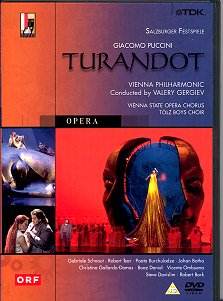The
tepid applause for the two principals at the end of this production
says it all. Botha’s Calaf is bland, the voice almost expressionless
and the acting and girth hardly that of a headstrong man sacrificing
and gambling all for the love of an ice maiden. All would
sleep through his ‘Nessun dorma!’ Schnaut, looking like a disorientated
Brünnhilde, rather than a Puccini heroine, is little better,
her high notes insecure, with too much vibrato and her acting
confined to grimaces and holding her head as if something vile
was continuously beneath her nose. Not so for Christina Gallardo-Domas
whose sweet lyricism drew for her Liù the warmest applause.
Robert Tear was in fine authoritative tone as Altoum the hapless
Emperor. Tear, aged 63, at the time of this 2002 recording is
still in excellent voice. Daniel, Ombuena and Davislim were all
good as Ping, Pang and Pong but were practically defeated by their
ridiculous costumes (more about the visual aspects of this production
below) in their sentimental Act II trio when they dream of peace
at home on their estates, even though against a floral backdrop.
My
highest marks are reserved for the beautiful playing in every
department of the Vienna Philharmonic under the baton of Gergiev.
I would just single out, as examples of their virtuosity and subtle
sensitivity, their playing of Puccini’s lovely moon music in Act
I, the music for Ping, Pang, Pong’s trio mentioned above and the
Act I climax as Calaf strikes the huge gong and the Processional
of Act II. Gergiev’s expressive interpretation subtly underlines
the mechanisation of Pountney’s conception, in Act I, without
sacrificing the essential Puccini
This
is a remarkable production - a modern conception as one can deduce
from the booklet cover illustration above. One first sees that
huge head in back view during the lovely Act I choral ‘Perché
tarda la luna’ lit appropriately blue and sylvan. The huge head
turns full face then splits down the middle to reveal Turandot
atop of a 9 metre train. The explanation in the notes runs – "Her
almost pathological hatred of men is … the reason she hides behind
a mask of rejection and inhumanity to protect her vulnerable psyche."
It must be said that Brian Large’s low camera angle looking up
at her as though from the pits of hell (low foreground coloured
blood red with the uniforms of the automatons) during the setting
of her three riddles is brilliant and quite terrifying theatre.
This Turandot is set in a totalitarian state populated
by robots, standing on tiers of scaffolding with large gear wheels
and looking like rows of ‘Edward Scissorhands’; robots that only
become human when Turandot surrenders to love. This mechanical
scenario just about kills the atmosphere of the lovely Act I moon
chorus rendering it grotesquely incongruous. Other costumes are
equally weird. Ping, Pang and Pong, for instance, dressed in plastic
macs have spanners and saws etc for arms.
Luciano
Berio’s ending is nicely integrated into the structure; the music
anodyne, and mercifully not anti-Puccini. The idea to ease and
make more appealing the transition from the sacrifice of Liù
to the declaration of love and surrender of Turandot is good but
it only partially succeeds here. The sight of the two principals
symbolically washing their guilt by bathing the body of Liù
lying on what looks like a morgue trolley with tin bowl is only
a few steps from Fawlty Towers farce.
Disappointing
performances from the two principals in an eccentric modern production
that is only partially successful mainly due to Gallardo-Domas’s
nicely expressive Liù and the beautiful playing of the
Vienna Philharmonic under Gergiev.
Ian
Lace
